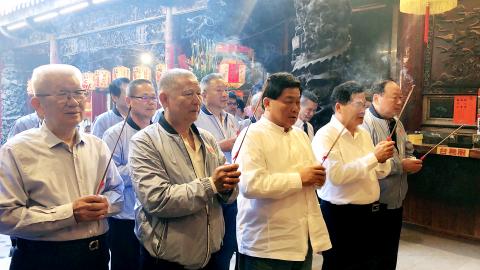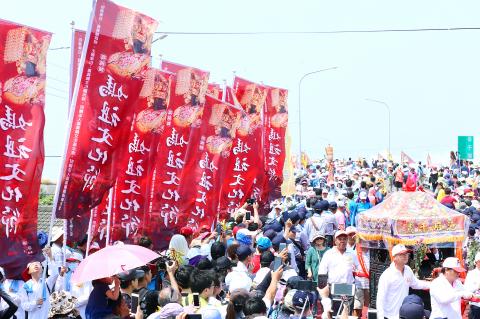The annual Dajia Matsu Pilgrimage has been postponed to comply with government measures aimed at preventing the spread of COVID-19, Jenn Lann Temple (鎮瀾宮) chairman Yen Ching-biao (顏清標) said yesterday, after sparking criticism on Wednesday for his insistence on holding the event.
Approximately 1 million people participate in the pilgrimage each year, with believers and visitors embarking on a 340km journey through central Taiwan and visiting more than 100 temples dedicated to the goddess Matsu along the route.
Yen had previously said that people should not be afraid to participate, because they would be protected by Matsu and other deities, while temple vice chairman Cheng Ming-kuen (鄭銘坤) said that the event would be canceled if Taichung was locked down because of the disease.

Photo: Chang Hsuan-che, Taipei Times
Yen yesterday apologized in a Facebook video to all followers of Matsu for having to postpone the event.
“Even President Tsai Ing-wen (蔡英文) has suspended all preparatory work for her inauguration ceremony on May 20 and made disease prevention the nation’s top priority. The pilgrimage can be held any time before the ninth day of the ninth month on the lunar calendar [Oct. 25 this year], which was said to be the day when the goddess ascended to the heavens,” Yen said.
“We will hold another meeting after the disease is under control to decide when the pilgrimage will be held. Matsu is merciful and she will bless everyone,” he said.

Photo: Tsai Tsung-hsun, Taipei Times
Yen said that he could not unilaterally decide to cancel the pilgrimage, as other people, including performing troupes for the parades and volunteers who cook meals, have been preparing for the event for months.
The temple on Wednesday night and yesterday morning held board meetings before deciding to postpone the event, he said.
Yen at a news conference yesterday morning denied that it was he who insisted that the event be held as scheduled and that the temple decided to postpone it because of pressure from Minister of Health and Welfare Chen Shih-chung (陳時中), who heads the Central Epidemic Command Center.
He consulted Chen by telephone because Chen is an expert in disease prevention, Yen said, adding that both would have had to work hard to contain the spread of the disease.
Yen said that he and the temple’s board of directors visited other temples in Changhua, Yunlin and Chiayi counties that are involved in the pilgrimage and explained the situation, adding that the reactions were mixed.
“You have to understand that they have to pay all the expenses themselves. We cannot settle this matter simply by making an announcement at a news conference or reimbursing them. You have to be more humane and considerate, and be more patient in explaining it to them,” Yen said.
The temple has donated NT$30 million (US$989,120) to help the government combat the spread of the disease, as it had pledged to do, he said.
Two other Matsu temples — Beigang Chaotian Temple (北港朝天宮) in Yunlin County and Baishatun Gongtian Temple (白沙屯拱天宮) in Miaoli County — have postponed their pilgrimages, which were scheduled for this weekend and next month respectively.
Tsai thanked Baishatun Gongtian Temple, Dajia Jenn Lann Temple and other temples nationwide for complying with the center’s advice to postpone or cancel religious activities.
The president wrote on Facebook that she fully felt the devotion, friendliness and warmth of Taiwanese when she joined Baishatun Gongtian Temple’s pilgrimage last year.
That adjustments could be made to coordinate between traditional rituals and disease-prevention efforts exemplify Taiwan’s beauty and are its most stabilizing power, she wrote, thanking all religious groups, who have been under pressure due to the issue, and their supporters.
The Ministry of Culture has listed the Dajia Matsu Pilgrimage one of the nation’s intangible heritages.
The Chinese Taipei Road Running Association yesterday said that the Taipei Freeway Marathon, which was scheduled for March 8, would also be postponed, while the Taishin Women Run would be postponed from March 29 to Aug. 23.

DAREDEVIL: Honnold said it had always been a dream of his to climb Taipei 101, while a Netflix producer said the skyscraper was ‘a real icon of this country’ US climber Alex Honnold yesterday took on Taiwan’s tallest building, becoming the first person to scale Taipei 101 without a rope, harness or safety net. Hundreds of spectators gathered at the base of the 101-story skyscraper to watch Honnold, 40, embark on his daredevil feat, which was also broadcast live on Netflix. Dressed in a red T-shirt and yellow custom-made climbing shoes, Honnold swiftly moved up the southeast face of the glass and steel building. At one point, he stepped onto a platform midway up to wave down at fans and onlookers who were taking photos. People watching from inside

A Vietnamese migrant worker yesterday won NT$12 million (US$379,627) on a Lunar New Year scratch card in Kaohsiung as part of Taiwan Lottery Co’s (台灣彩券) “NT$12 Million Grand Fortune” (1200萬大吉利) game. The man was the first top-prize winner of the new game launched on Jan. 6 to mark the Lunar New Year. Three Vietnamese migrant workers visited a Taiwan Lottery shop on Xinyue Street in Kaohsiung’s Gangshan District (崗山), a store representative said. The player bought multiple tickets and, after winning nothing, held the final lottery ticket in one hand and rubbed the store’s statue of the Maitreya Buddha’s belly with the other,

‘NATO-PLUS’: ‘Our strategic partners in the Indo-Pacific are facing increasing aggression by the Chinese Communist Party,’ US Representative Rob Wittman said The US House of Representatives on Monday released its version of the Consolidated Appropriations Act, which includes US$1.15 billion to support security cooperation with Taiwan. The omnibus act, covering US$1.2 trillion of spending, allocates US$1 billion for the Taiwan Security Cooperation Initiative, as well as US$150 million for the replacement of defense articles and reimbursement of defense services provided to Taiwan. The fund allocations were based on the US National Defense Authorization Act for fiscal 2026 that was passed by the US Congress last month and authorized up to US$1 billion to the US Defense Security Cooperation Agency in support of the

HIGH-TECH DEAL: Chipmakers that expand in the US would be able to import up to 2.5 times their new capacity with no extra tariffs during an approved construction period Taiwan aims to build a “democratic” high-tech supply chain with the US and form a strategic artificial intelligence (AI) partnership under the new tariffs deal it sealed with Washington last week, Taipei’s top negotiator in the talks said yesterday. US President Donald Trump has pushed Taiwan, a major producer of semiconductors which runs a large trade surplus with the US, to invest more in the US, specifically in chips that power AI. Under the terms of the long-negotiated deal, chipmakers such as Taiwan Semiconductor Manufacturing Co (TSMC, 台積電) that expand US production would incur a lower tariff on semiconductors or related manufacturing